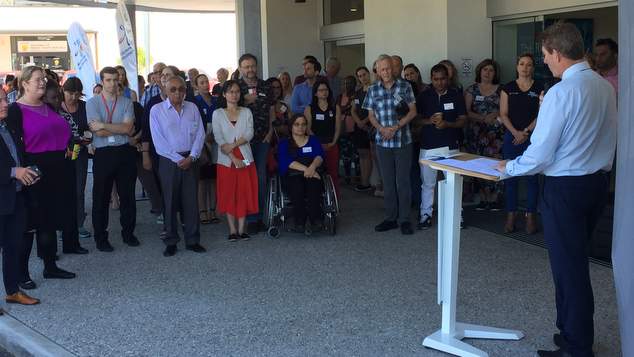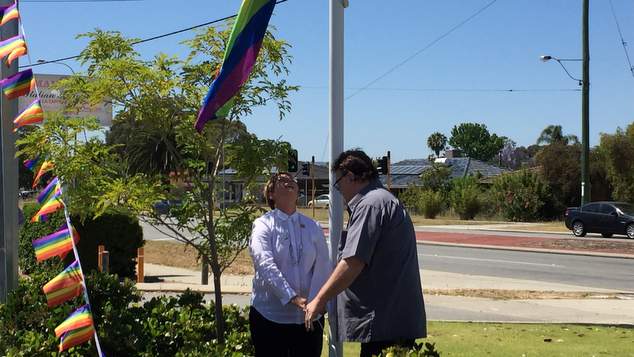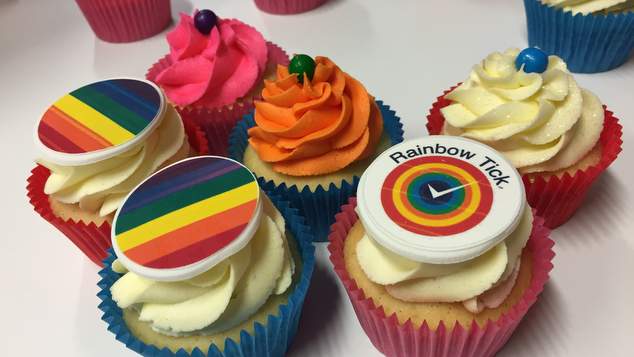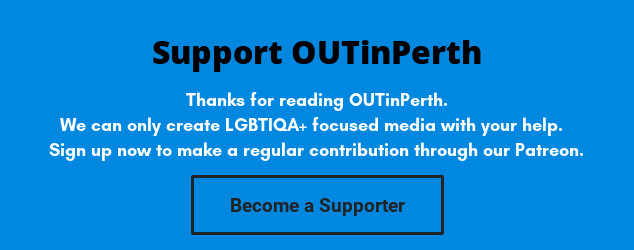
Richmond Wellbeing has been working hard to make sure they’re inclusive of LGBTIQ+ people and cater to their needs for several years. The organisation has taken part in the annual Pride parade for several years, and last year became the first organisation in Western Australia to be awarded the Rainbow Tick accreditation for their inclusive practices.
Today, on the first anniversary of the marriage equality postal survey decision, the organisation took another step in embracing the LGBTIQ+ community by raising the rainbow flag in front of their head offices. The flag will be flown permanently alongside the Australian flag, and the Aboriginal and Torres Strait Islander flags.
Neil Guard, the Chief Executive Officer of Richmond Wellbeing, said it was fitting that one year on from the historic vote on same-sex marriage the organisation continued to focus on ensuring people were able to engage with their services by being a prominent supporter of the LGBTIQ community.
“Several years ago the development of more LGBTIQ inclusive mental health services was highlighted to our organisation by the growing evidence of the over-representation of the LGBTI communities in all the mental health statistics.” Guard said.

The CEO also noted that the organisation’s own employees were calling on the management to take a proactive approach to providing mental health support to LGBTIQ people.
“Fundamentally everyone in the community has a right to be able to access health services, health services that are welcoming and safe. To do this health service providers have a responsibility to learn about the communities they serve.” Guard said.

Mental health advocate Renai Searle spoke at the flag raising and noted what a significant difference it makes to people knowing that their sexuality and gender identification will be respected and embraced by an organisation.
“The approach has always been treat everybody equally, but all the research shows that a holistic approach, a whole person approach to mental health care and support that is important. For that the occur it’s not about treating everybody equality, it’s about treating everybody individually.”
“Richmond hosting the flag today is just one of those barriers coming down a little, knowing that I don;t have to leave my partner in the car, or when I say my partner and I were doing X,Y,Z I’m not going to be asked what his name is.” Searle said.

Searle said the flag flying out the front of the organisation would send a clear organisation that this was a place that LGBTIQ people could approach for help.
Neil Guard said the organisation was proud to say it had worked hard not only to be welcoming to LGBTIQ clients, but also their own staff who were part of the queer community. The CEO admitted the organisation had not always been inclusive of it’s LGBTIQ staff.

William Harbeck, who is a supervisor at Richmond Wellbeing’s Bunbury site, recalled that when he first joined the organisation it was not welcoming for LGBTIQ staff members. Harbeck said when he first joined the organisation his manager made it very clear that he did not agree with homosexuality.
“This was very difficult for me because I was just starting to tell my friends and family about my sexuality. When my manager discovered my sexuality he made it very difficult working. During this time I became very depressed, anxious and felt I was not worthy of being an employee.”
Harbeck said he was so happy that the organisation had now embraced LGBTIQ people by getting rainbow tick accreditation, taking part on the Pridefest and by raising the rainbow flag.
“I can honestly say I’ve seen some amazing changes over the years. I can honestly say that I now work in an organisation alongside some very inclusive people.” Harbeck said.
Harbeck, alongside Executive Finance Manager Maryanne Wilson, raised the rainbow flag in front of a large crowd.

What services to Richmond Wellbeing offer?

To find out more about Richmond Wellbeing, and their dedication to gaining Rainbow Tick accreditation, OUTinPerth chatted to their Executive Manager Operations, Adrian Munro.
For people unfamiliar with Richmond Wellbeing – how would you describe what your organisation does.
RW provides mental health support services in the community. We provide supported accommodation services, as well as supports to those living in their own home, including the NDIS. We predominantly support people who live with severe and persistent mental health issues but we have a holistic approach to the support we provide.
This considers all aspects of their life including family and friend supports, physical health and wellbeing as well as their emotional wellbeing. We work in the recovery approach as we believe that people can and do recover from mental distress, often resulting in them being stronger, wiser and braver people in the future.
Why did Richmond Wellbeing decide to go for Rainbow Tick accreditation, what business benefit does it bring the organisation?
We know that unfortunately, the physical and mental health outcomes of the LGBTI communities are worse than the rest of the population. We also know that a significant reason for this is that the services are not welcome, safe or appropriate for the LGBTI communities.
We believe that everyone in the community should be able to access health services that are welcoming and safe for them, and that it is the responsibility of service providers to learn about the communities they serve and adapt their services accordingly. The mental health outcomes of the LGBTI communities are unacceptable and we need to do everything we can as a mental health service provider to improve this.
The benefits are that people who identify as LGBTI feel welcome in our service; we have a growing number of LGBTI clients accessing our services. We also have a number of employees who identify as LGBTI working at Richmond Wellbeing. We see this not only as a health issue but a social justice issue and we are raising awareness of this throughout the broader community.
What new initiatives have been implemented at the organisation to make it more open to LGBTI people?
This starts from before clients even access our services as we have modified our website and print material to be more welcoming to the LGBTI communities. When people enter our services, our staff are better trained in working with the LGBTI communities, in a manner that is more sensitive and welcoming.
This has included our employees undertaking training and being mentored by employees who identify as LGBTI. We have a better understanding of the unique needs of LGBTI communities but really, everyone is an individual and has unique needs, we are just becoming more aware of the needs specific to the LGBTI communities. We will now be flying the rainbow flag outside our office as a sign to LGBTI communities that they are welcome in our service.
Has it been challenging to meet the requirements of the rainbow tick approval process? What was the most biggest mind shift or change you needed to implement with your team?
Achieving Rainbow Tick accreditation is a significant task and one that organisations should not undertake lightly. It requires organisations to demonstrate that the principles and practices of the Rainbow Tick are imbedded throughout the organisation.
Having a group of staff passionate and engaged is not sufficient, it requires a whole of organisation approach, led by the Executive. It requires significant investment of staff time and strong leadership to change the culture and truly reflect on the practice of the organisation.
Rainbow Tick accreditation usually takes at least a year to achieve, from starting the process to completing accreditation. Staff need to be able to reflect on their practice and beliefs in order to achieve the necessary changes.
What have you learned about gay, lesbian, bisexual and transgender people through this process?
Personally I have learned so much more about the discrimination people who identify as the LGBTI face in so many aspects of their daily life, especially when they access health services. I have learned that there are ways that health services can make their service more approachable and safe to the LGBTI communities, and this learning is based on having compassion, being willing to listen and reflect, and be guided by people who identify as the LGBTI.
I’ve also learned that we can all work together to make positive changes in our community as this is a whole of society issue, not just a health service issue. Everyone has a responsibility, regardless of what sector you work in, to change our society for the better to be more understanding of and inclusive for the LGBTI communities, because this makes us a better society.
Now that you have gained the Rainbow Tick accreditation, how is your organisation encouraging other businesses in your sector to improve services for LGBTI people?
We are endeavouring to show leadership in this space and encourage others to either go for Rainbow Tick accreditation or a least start on their journey of learning from the LGBTI communities and making positive changes.
It all starts by people being able to reflect on their own beliefs and actions and think about how our community could be a better and more inclusive one. We are assisting other organisations to improve their services and being strong advocates in the LGBTI space. In the future we aim to lead a forum for all service providers to participate in, which will improve their organisational capacity to be safe and welcoming for people who identify as LGBTI.
Find out more about Richmond Wellbeing and their services.
Graeme Watson






